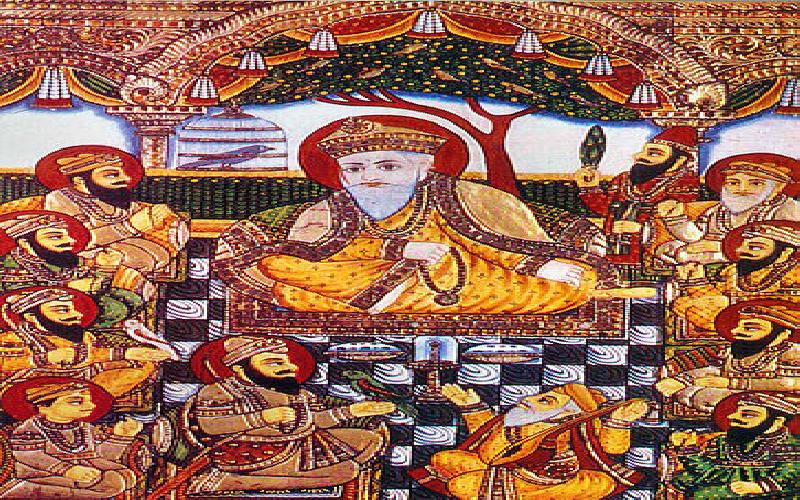Sikhism is more than a religious philosophy. It was a reaction to the religious fanaticism of the times, which was leading to ritualistic unmindful practices in the name of religion in Hinduism, while the Muslim emperors of the time followed a fanatic, communal approach of persecuting those opposed to them in the name of religion. In such times, Sikh Gurus were part of those few enlightened souls which led the so called Bhakti Movement, criticising fanaticism, promoting human values, and showing the true light of wisdom that can guide humanity...
The teachings of the SIKH GURUS are the essence of Sikhism
philosophy. To the followers of the Sikh faith, they constitute the final word on religion, faith and conduct. Most of these teachings are available to the world today by way of the holy book, GURU GRANTH SAHIB, which in itself was designated as the Eleventh Guru by the last of the Sikh Gurus, GURU GOBIND SINGH.Sikhism - Origin & Evolution
From ancient times till date, India has had a tradition of enlightened minds helping other understand the intricacies of this universe, society and our lives. These teachers, known as ‘Gurus’ are greatly revered for their contribution to enlightenment of humanity. In many cases, these Gurus have extensive following, which then take a form of a sect that identifies itself with the preaching of their Guru, and try to imbibe the values taught by him. In some cases, a popular teacher appoints is successor before his demise, to continue the tradition of guidance of his followers, and hold regular ‘SATSANG’ meaning company of purified souls.
Sikhism originated in the same manner, in late fifteenth century in North India, from the teaching of the first Sikh Guru, GURU NANAK DEV, and nine successive Gurus till eighteenth century. The word Sikh originates from the word SHIKSHA means teaching or learning. Since it is based on the teaching of the GURU or teacher / master, hence the Sikh Gurus are placed at a very pedestal.
Around fifteenth century, Hinduism in India was facing several crises. Large parts of India had been invaded by the Muslim invaders from tenth century AD onwards, and by fifteenth century, Muslim emperors were occupying the throne at Delhi. Many of these kings propagated Islam with great zeal, even using force for conversion. This also gave rise to tensions between Hindus and Muslims, and these differences were made use of by both religious heads of communities for their own agendas. During this period, Hinduism became very ritualistic, as the tradition of open debate and discussion got lost after the destruction of the great Universities of TAKSHASHILA (in Western India, now Pakistan) and NALANDA (in Eastern India, state of Bihar).
A New School of Religious Philosophy
In this background, Sikhism originated as new school of religious philosophy within Hinduism that advocated openness to all, denounced all communalization based on religion, class or caste. The ten Sikh Gurus treated all human beings as equals, placed emphasis on treating all men and women as belonging to the same family of humanity and criticized the complex ritualistic practices that had become prevalent in Hinduism.
To begin with, Sikhism was a loose group of individuals who followed the teaching if the Sikh gurus. Gradually, they became more organised and attained a distinct identity as a sub-sect within Hinduism. Most of the
followers of Sikhism, in fact, came from Hindu families, as Sikh gurus were always revered as divine personalities by all Hindus. Subsequently, Sikh gurus and followers were persecuted by Muslim Emperors, who were uncomfortable with the growing influence and followership of Sikh gurus.Reaction to Persecution by Muslim Emperors
Two Sikh gurus, GURU ARJAN, the fifth guru and GURU TEGH BAHADUR, the ninth guru were killed by the Moghal emperors of Delhi for refusing to give up their faith and convert to Islam. As a reaction, the followers of Sikhism, which began by advocating the bridging of gap between Hindus and Muslims, were forced to organise themselves to defy the Muslim emperors by Military resistance. Later, under the leadership of Maharaja Ranjeet Singh, Sikhs became an important force in North India. Today, with around 25 million followers, Sikhism is the fifth largest religious group in the world.
Teachings of Guru Nanak, the First Sikh Guru
Nanak, born in a Hindu family, differed with many of the complex rituals of the day in Hinduism, and also disliked the divide between Hindus and Muslims. Instead, he propagated a simple philosophy that is easy to comprehend, follow and practice. In fact, his first disciple, MARDANA was a Muslim, while most of his disciples were Hindus.
Nanak preached equality of all human beings, undermined communalisation of human societies, and preached compassion to all especially poor. Guru Nanak placed the greatest emphasis on truthfulness and honesty. In many ways, he differed with many of the beliefs and practices prevalent in Hinduism at that time. Nanak did not believe in Heaven and hell, neither did he concur with the ideal of asceticism. According to Nanak's teaching, a person can follow faith and get close of god while undertaking his duties as a family member.
The Philosophy of Sikhism
Sikhism, Sikh religion, Sikh values, meaning of Sikhism, Bhakti movement, Guru Granth Sahib, Shri Guru Granth Sahib, Origin of Sikhism, Evolution of Sikhism, Guru Nanak Dev, Guru, Ten Gurus of Sikhs, Takshashila, Indian Renaissance, Nalanda, Persecution of Sikhs, Persecution by Muslim Emperors, Guru Angad Dev, Guru Teg Bahadur, Maharaja Ranjeet Singh, Mardana, Teachings of Guru Nanak
Sikh philosophy originated from the ten Sikh gurus. In Sikh belief, almighty god is treated as a formless, eternal, unobserved, omnipotent and infinite. His existence is denoted in Sikhism by the term 'EK OMKARA' that emphasizes the unitary nature of god. Sikhism emphasizes the importance of meditation as the primary way of salvation and self realization. Salvation or a spiritual union with god is the final goal of every human being, as per the Sikh teachings. It is the only way to get rid of the cycle of repeated birth and death or re-incarnations that are one of the reasons of all human sorrow and suffering.










